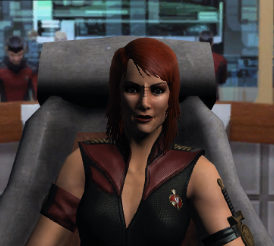I agree with you about the Mirror Universe as Deep Space Nine sort of tries to ruin the concept by having it taken "seriously"
Huh? The DS9 writers approached the Mirror Universe episodes as their excuse to cut loose and have fun, to be as self-indulgent and crazy as they wanted. They took it less seriously than TOS did.
(and also with the horribly un-Trek idea that reforming the Terran Empire got the human race enslaved).
How is it "un-Trek" to acknowledge that actions can have unintended consequences? Trek is not about rose-colored glasses and pretending nothing bad ever comes from good intentions. If that were the case, we wouldn't have "Charlie X" (rescuing a stranded teenager unleashes a monster), "Miri" (life prolongation experiments lead to global plague), "A Private Little War" (trying to stop Klingon interference results in an escalating cold war), "The Ultimate Computer" (a computer created to save lives ends up killing thousands), "The Mark of Gideon" (a people's extreme love of life leads to hellish overpopulation), etc.
Besides, despite TNG-era Roddenberry's desire to turn Trek into some idealistic philosophical tract, it's still what TOS-era Roddenberry originally intended it to be -- a TV show, a work of entertainment. And that means its stories are driven by conflict and crisis, just like any other fictional work. If you're going to bring the Mirror Universe back, you pretty much have to show it still in crisis, still dystopian to serve as a contrast to the utopian Federation. That's what pretty much every Mirror Universe sequel has ever done. DC's version established that Mirror Spock had considered Kirk's words and rejected them, so that he was still loyally serving Mirror Kirk 15 years later. Diane Duane's
Dark Mirror established that Spock's reforms failed and the Empire was still going strong in the TNG era. DS9 just chose a different failure mode -- one that was actually
less pessimistic, because it had Spock actually succeed, with the failure being the result of external forces. If Spock's reforms
had succeeded the way Kirk hoped, then there'd be no story. It would just be Starfleet officers visiting another benevolent civilization, and what's the point of that?
What makes it Trek-like is the contrast with the main universe. It's a reminder that a better future isn't guaranteed, that it has to be striven for and carefully maintained, because the potential to fall into darkness is always there too. We're killers, but we won't kill today. That's always been Trek's message -- not that a better future is inevitable, but that it has to be earned.
It's why I changed it for my ongoing Trek RPG that the Rebellion succeeds and everything is awesome for about five minutes before the humans promptly enslaved everyone else again.
Wait a minute, what? That's basically the exact same thing DS9 did, just with the players inverted. How can you object to that approach and then use it yourself?



